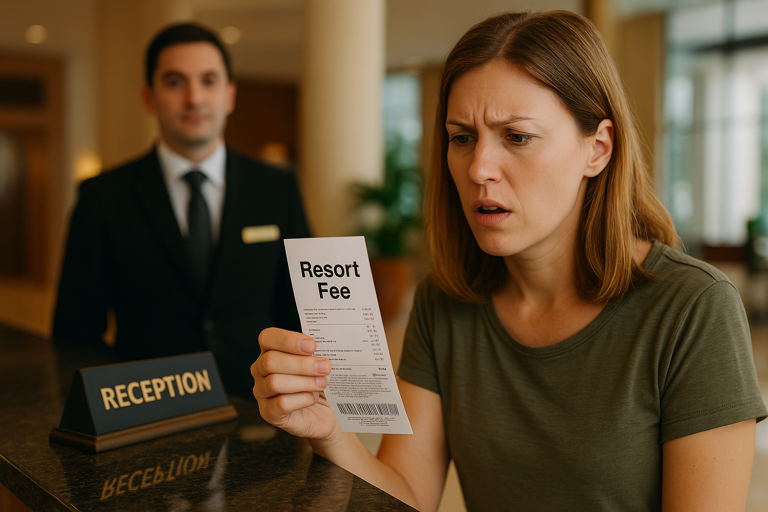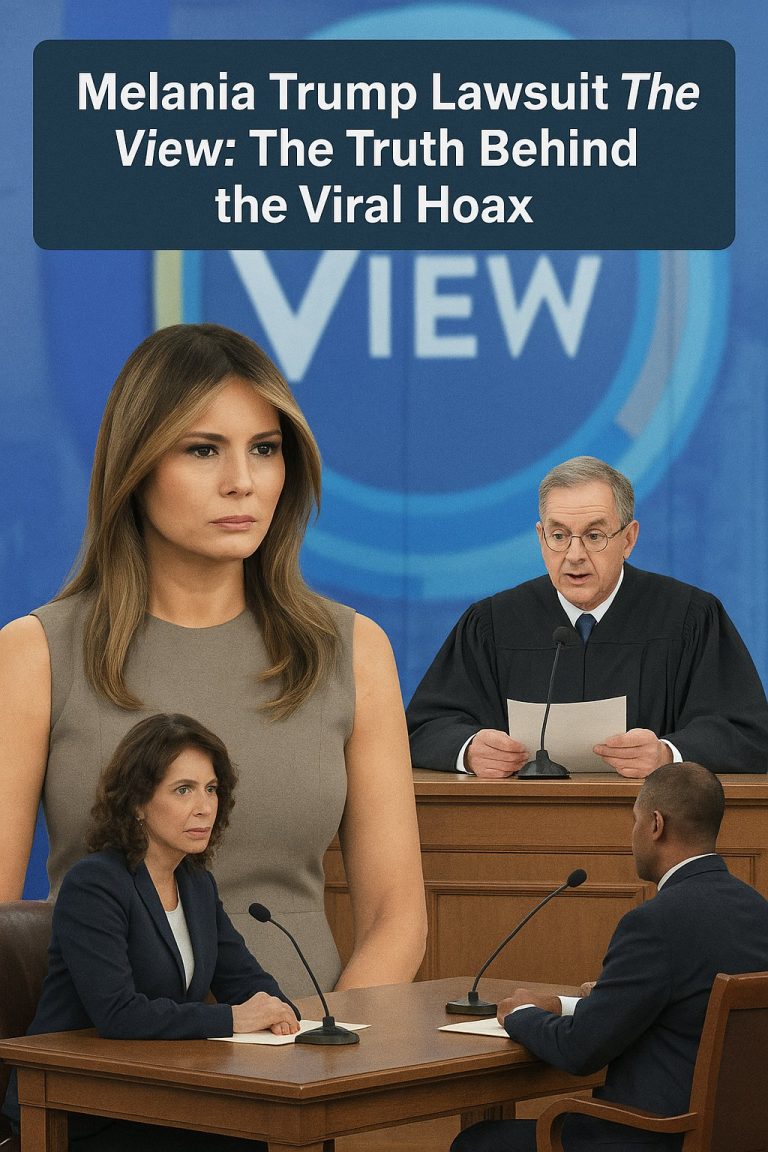A fraudulent resort fees lawsuit refers to growing legal action against hotels that add hidden charges without providing real value. You book a room expecting one price, but your bill jumps with surprise fees. These mandatory charges often cover services you don’t use—or can’t access. Travelers across the country are pushing back. Hotels say it covers things like Wi‑Fi, pool access, or gym use. You may also see it referred to as a facility fee, destination fee, or urban fee. It usually appears near the end of your booking—after you’ve been shown an attractive base price.
Here’s the problem: you think you’re booking a room for $200 per night, but when the final page loads, the total jumps to $235. That’s the resort fee. You didn’t choose it. You couldn’t decline it, and you were just told to pay it.
Hotels claim this fee supports added services. But what if you never use those services? What if they weren’t even available during your stay? That’s when it stops being fair—and starts becoming deceptive. This guide shows you what’s happening, how the law supports your claim, and what steps you should take right now.
When Does a Resort Fee Cross the Line?
Not every resort fee breaks the rules. The fee becomes fraudulent when it hides the real cost of your stay. You may have seen the nightly rate, but not the total price with the added fees. That’s called drip pricing. It’s misleading.
Now think about what happens if the services listed in the fee weren’t available. Maybe the gym was under renovation, or the shuttle was canceled. Maybe the Wi‑Fi was already free for loyalty members. If you paid for something you couldn’t use, that’s where the Fraudulent Resort Fees Lawsuit starts to build.
Real Stories That Show the Impact
Many travelers have shared their stories. A man paid a $30 daily resort fee and found the gym closed. A couple booked a romantic weekend and couldn’t use their pool access due to maintenance. Another traveler received dining vouchers as part of their fee—but couldn’t book a table at the hotel restaurant the entire stay. You may have faced something similar. You didn’t get what you paid for and felt tricked. That’s exactly what fuels these lawsuits.
Understanding the Legal Arguments Behind the Lawsuits
Let’s break down the key legal claims you’ll find in these cases:
Deceptive Advertising
You’re shown one price, but charged another. That’s false advertising. You weren’t given the full cost up front, so your decision was based on incomplete information.
Breach of Contract
If the booking terms didn’t clearly state that an extra fee would be charged, that may violate contract law. You agreed to a specific price. The hotel charged more. That’s a breach.
Unjust Enrichment
This claim says the hotel benefited at your expense. You gave them money for services. They didn’t provide them. They kept the money. That’s unjust.
Unfair Competition
Some hotels follow the rules and show the full price. Others hide part of the price in a fee. That gives them an unfair advantage. That’s why this claim gets added to many lawsuits.
Lanham Act Violation
This federal law covers false advertising. If the way the hotel markets its pricing causes confusion or misleads consumers, it might qualify under this act too.
The Problem with Drip Pricing
Drip pricing means you see a low price first. Then, slowly, hidden fees get added. It’s like ordering a $10 sandwich, but each topping, napkin, or plate costs extra. In the hotel world, you book thinking it’s $180 a night. But by the end, it’s $225.
You may already be emotionally invested. You’ve browsed photos. You’ve read reviews. You’re ready to click “confirm.” Then the price goes up—but you still book. That’s how hotels get you. That’s what regulators and lawyers are trying to stop.
What the Law Says
Attorneys build cases using multiple legal grounds:
| Legal Claim | What It Means |
|---|---|
| Deceptive Advertising | Price listed doesn’t reflect true cost |
| Breach of Contract | Booking didn’t include added fees |
| Unjust Enrichment | Hotel kept money for services not given |
| Unfair Competition | Transparent hotels lose to deceptive ones |
| Lanham Act Violation | False advertising harms consumers |
Each supports a Fraudulent Resort Fees Lawsuit. Lawyers combine them to demand refunds and policy changes.
The FTC Cracks Down on Junk Fees
The Federal Trade Commission responded to this problem with the Junk Fees Rule. As of May 12, 2025, all hotels must show the total cost—including fees—on their booking pages. This rule doesn’t ban resort fees. It just says hotels can’t hide them. You should see the real cost up front, right away. No surprises. That helps you make informed choices and compare prices fairly.
What States and Travel Advocates Are Doing
States have joined the fight too. Texas, Pennsylvania, and others filed lawsuits against big hotel brands. Companies like Hyatt, Marriott, Hilton, and Booking Holdings were targeted for deceptive pricing practices. Groups like Travelers United also took legal action. They filed suits against Hilton and Sonesta for adding destination fees that weren’t clear during booking. These cases demand change. They seek refunds and want courts to force hotels to adopt full transparency.
What You Could Receive If You Join a Lawsuit
If you’re part of a Fraudulent Resort Fees Lawsuit, here’s what lawyers might demand on your behalf:
Refunds for the Resort Fees You Paid
You could get your money back for fees tied to services you didn’t use or didn’t know about when you booked.
Triple Damages in Certain States
Some states allow triple compensation. If you paid $50 in fees, you might be eligible for $150 in damages.
Restitution for Unavailable Services
Did you pay for a shuttle that didn’t run or a spa that was closed? You may qualify for reimbursement.
Legal Costs and Attorney Fees
If the court sides with consumers, hotels may have to cover legal expenses too.
Credits or Hotel Vouchers in Settlements
Some lawsuits settle out of court. That may include vouchers or future discounts for affected guests.
What Counts as a Deceptive Resort Fee?
Now let’s talk about what hotels often promise under resort fees—and what they really deliver.
Wi‑Fi
Hotels list Wi‑Fi as a benefit under the resort fee. But it’s already free for loyalty members or sometimes free throughout the hotel. So you paid for something they give away.
Gym Access
The gym might be closed, under repair, or overcrowded. If you couldn’t use it, the hotel still kept the money.
Shuttle Service
It sounds helpful, but it might run only at limited hours—or not at all.
Pool Use
What if the pool’s under renovation? What if the weather closes it? You still pay the fee.
Breakfast Credits
Some hotels give a $25 credit. But good luck booking a breakfast table. Slots may be full, or credit may not cover the real cost.
Bike Rentals
Only a few bikes may be available. They’re taken early. You miss out—but still pay.
Spa Discounts
These are common in resort fees. But if you can’t book a slot, the discount means nothing.
What You Can Do If This Happened to You
Let’s walk through what to do next.
Gather All Your Booking Records
Save every email, receipt, and screenshot. Focus on price shown, fees charged, and services promised.
Note What Services Were Unavailable
Make a list. Was the gym closed? Was the pool empty? Did the shuttle run?
Contact a Lawyer or Class Action Firm
You don’t have to file alone. Legal teams are already investigating these cases. You may join an existing class action.
Report It to the FTC or Your State Attorney General
Regulators want to hear from travelers like you. Your complaint can support active cases.
What Happens If You Win?
If your case wins, you may receive:
Money back for the fees
Compensation for time and inconvenience
Legal fee coverage
A role in helping others avoid the same trap
Even one voice can support big change. Lawsuits have already forced brands to revise their booking practices. You can be part of that shift.
Wrapping It Up
Fraudulent Resort Fees Lawsuit claims are about honesty. You booked in good faith, trusted the price and paid for something that didn’t deliver. That’s not okay. Legal teams, regulators, and travelers are pushing back. FTC rules now require full price disclosure. Lawsuits go further—demanding refunds and fair treatment. You’re not alone. You have rights and can fight back. You can help stop deceptive fees. That’s the heart of the Fraudulent Resort Fees Lawsuit
Ayesha Awais is a content writer for JudicialNexus.com, covering accident reports, injury-related news, lawsuits, and public safety updates. All content is informational in nature and based on publicly available sources.




